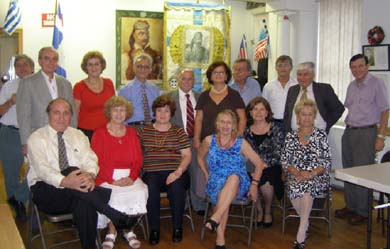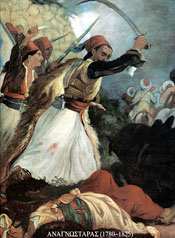 |
|
|
The Alosis of Tripolitsa Celebrated |
|
| Bravery, self-sacrifice, focus and risk taking characterizes the Greek people in world civilization. On Sunday, September 24th, 'The Geros tou Morea' (the Old Man of Peloponnese, Kolokotronis) chapter of the Pan Arcadian Federation of America celebrated "The Alosis of Tripolitsa" (Siege of Tripolis). A memorial service was held at St. Demetrios Church in Astoria. A luncheon and lecture followed at the Arcadian House at 27-02 39th Ave. in Long Island City. |
|
| "The liberation of Tripolis was the turning point in the Greek Revolution," said Dr. John G. Siolas, Associate Professor at Touro College. "Tripolis lies at the center of the Peloponnese. The city was an economic, social and military center. The siege and subsequent surrender of Tripolis was the first major victory of the Greek forces under General Theodoros Kolokotronis. This triumph resulted in the formation of the Modern Greek state." |
 "The Geros tou Morea" chapter of the Pan Arcadian Federation of America |
"Theodore Kolokotronis was trained by the British military in Zakynthos," explained Dr. Siolas. "He was elevated to the rank of general by the English forces. Brilliance, patriotism, a leader among men were his personal attributes. He was born in a small village outside of Kalamata. But, his ancestry was from Arcadia, immortalized by Shelley's poem 'Ode to a Grecian Urn.' The first towns to be freed from Turkish rule were mountainous Valtesi and Levithi in the Peloponnese. The Valtesian hero, Anagnostaras, a handsome, long-haired, mustached soldier with a sword has been immortalized. He was Theodoros Kolokotronis' brother-in-law. He is shown in portraits as single-handedly fighting off hordes of the enemy. He was a valiant hero who inspired Kolokotronis' troops." |
|
|
"At the time, Prince Demetrios Ypsilante and General Theodoros Kolokotronis commanded the Greek armed forces at the 'Alosis of Tripolitsa'," said Dr. Siolas. My two great-great-grandfathers, Kostaki and Georgaki Siolas were the bodyguards of Kolokotronis. They survived the Siege, but were killed later in other battles.
Starvation took a death toll on the city's civilian population. The Siege's turning point was a negotiation with the defending Albanian forces. They cooperated with Kolokotronis in return for safe passage back to Albania. Albanian forces helped free the city from the Turkish defenders." |
 1821 hero Anagnostaras (Panayiotis Anagnostou) |
|
|
|
|
(Posting date 05 November 2006) HCS encourages readers to view other articles and releases in our permanent, extensive archives at the URL http://www.helleniccomserve.com/contents.html, especially other fine articles penned by Dr. Tsounis in the eponymously titled section of our archives at http://www.helleniccomserve.com/archivetsounis.html. |
|
|
|
|
2000 © Hellenic Communication Service, L.L.C. All Rights Reserved.
http://www.HellenicComServe.com |
|
